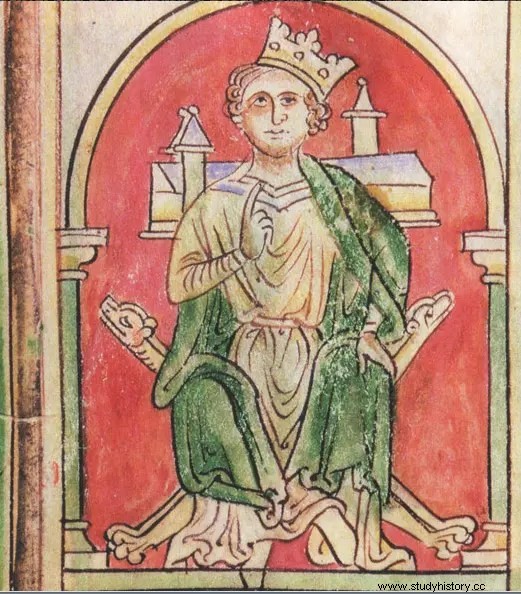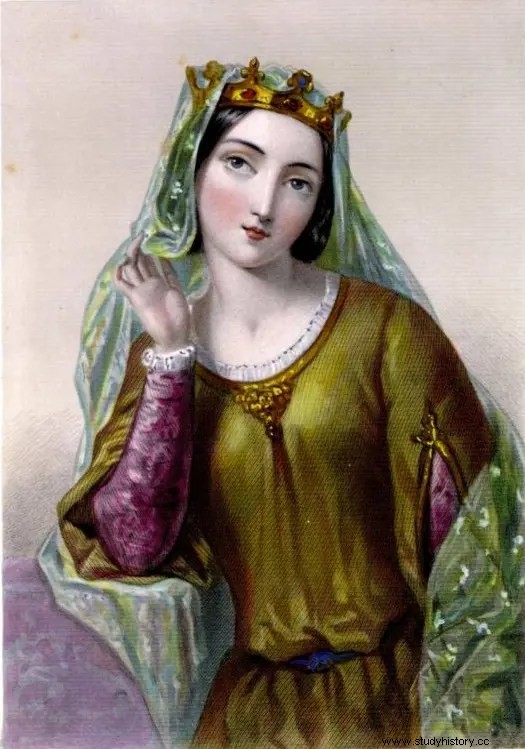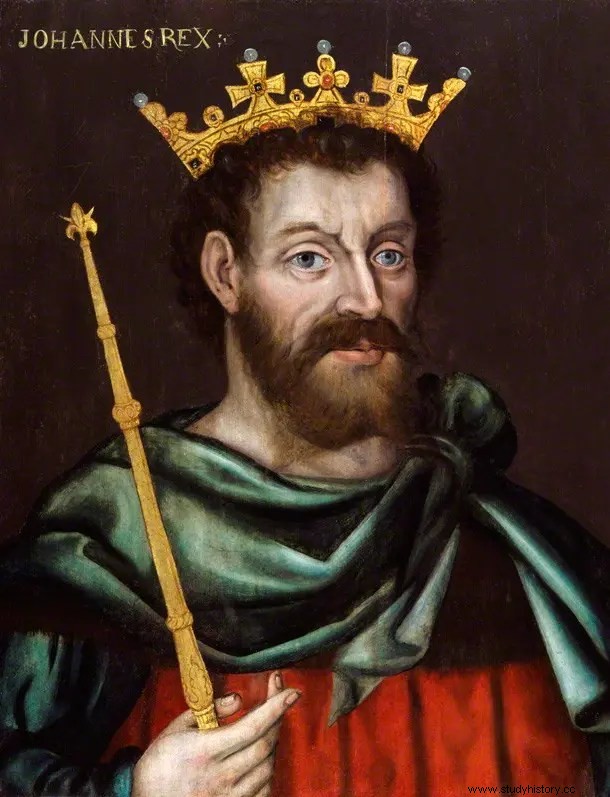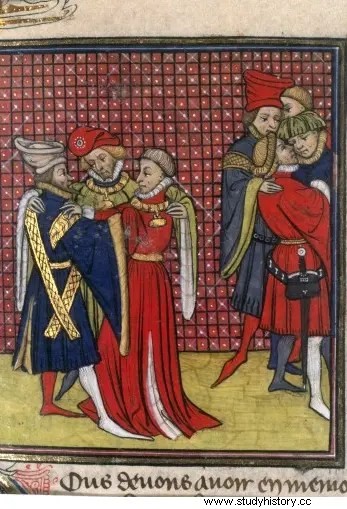Married to one of the most controversial sovereigns in the history of England, Isabelle d'Angoulême is one of those leading women of the Middle Ages , whose life worthy of a novel deserves to be told!
The “kidnapping” of Isabelle by Jean Sans Terre
The one who will go down in history as Jean Sans Terre was not meant to rule at all. He is the last son of King Henry II of England and his wife Eleanor of Aquitaine. After the death of his three older brothers, and the reign of 10 years of Richard the Lionheart, the crown finally returns to him …
Since his earliest years, thirsty for power , Jean never ceased to maintain the revolts against his own brothers. His accession to the throne is a consecration for him. His possessions inherited from his father Henry II are vast:England, Normandy (since William the Conqueror, Duke of Normandy, became King of England) and a large majority of western France .
From 1200, John visited his French provinces. At the castle of Lusignan , a powerful family from Poitou, a party is given in honor of this recently crowned King. Isabelle , sole heiress of the Count of Angoulême, is present. She is indeed engaged to Hugues de Lusignan , Count of La Marche. As is often the custom for young girls, Isabelle has settled in the Château des Lusignan, with the family of her future husband.

For the King of England, it was love at first sight. Isabelle d'Angoulême, aged about 14, is known to already be of incomparable beauty . He fell in love with this "Helen of the Middle Ages ”, which already shows a assertive character . Without regard for the fiancé, he kidnaps Isabelle (probably all the same with the consent of the main interested party…) and marries her in Bordeaux!
Some affirm that Jean then obeys political considerations, wishing to prevent a union between the two most powerful families of Poitou. But the behavior of the King is far from being a model of diplomacy and political intelligence!
Jean knows very well that he is breaking all the rules of feudal law by humiliating the powerful Lusignan family. So he sets sail for England where he hastens to have his wife crowned. Isabelle is therefore crowned Queen of England at Westminster on October 8, 1200. That same year, in France, Blanche of Castile married the heir to the throne, Louis, son of King Philippe-Auguste.
Born to be Queen
The wedding festivities last several months. While the Lusignans rally to the King of France Philippe-Auguste against England by asking reparation for the affront made to Hugh , Jean Sans Terre complacently watches his very young wife organize brilliant balls and banquets:she adores Court entertainments , and often dances until the early hours.
Quickly, Isabelle takes the measure of her husband:corrupt, cowardly, unstable and brutal to the point of cruelty. However, many contemporaries remarked that the King seemed particularly in love with his wife. The young Queen adapts very quickly to her new life, as if she was born to ascend the throne. She quickly develops awareness of her dignity , of her new position, a feeling that will not leave her until the end of her life.
Its official seal we show her crowned and sumptuously dressed, curls of hair falling on her cheeks :Isabella by the grace of God Queen of England and Lady of Ireland . On its second seal, reserved for private letters , she appears uncrowned:Isabelle Duchess of Normandy, Aquitaine and Anjou .
Isabelle d'Angoulême surrounds herself with an important "house", and obtains a very extensive wardrobe without being luxurious:pelissons gray fur, green or brown cloth dresses lined with taffeta, embroidered sandals or boots... Her husband displays a flashy and excessive luxury that his subjects reproach him for:it is not uncommon to see him covered in precious stones from head to toe!

The loss of Normandy
Meanwhile, Philippe-Auguste immediately saw what advantage he could derive from this serious breach of feudal principles from the King of England. However, he wants above all to attempt conciliation.
John and Isabella were invited to stay in France in June 1201. A contemporary did not fail to remark, somewhat outraged , that Isabelle is not afraid to "extend sleep from morning until lunchtime ! This is the first meeting between Isabelle and Blanche of Castile , called to ascend the throne of France. The sovereigns return to England without any solution having been found...
King Philippe-Auguste sends negotiators to England, again a failure . Jean then refuses to appear before the Court of the barons, his peers, as is customary at that time when diplomatic channels have failed. The Court met without him on April 28, 1202 and deprived him “of all the land that until now he and his ancestors had held from the King of France ". That is Normandy.
By his reckless conduct, John had given King Philip all the desirable assets to undertake the conquest of this long-coveted Normandy .
In the space of 2 years, it's done. In 1204, when the news of a definitive defeat was announced, John turned to his wife:“Do you understand, my Lady, I have lost everything for you ". To which she replies:"Sire, I have lost the best knight in the world for you !
This 17-year-old Queen does not talk in her pocket ! His lord and master does not frighten him. Perhaps she is also referring to the recent discovery that Jean is cheating on her, and that he already has several bastards. However, Isabelle is smart enough not to take too much offense , as long as he gives precedence to her.
In 1207, Isabella, about 19 years old, finally fulfilled her dynastic duty by giving the crown a boy, the future Henry III. In the years that followed, Richard, Duke of Cornwall, was born again in 1219, Joan, future Queen of Scotland, in 1210, Isabella, future Empress of the Holy Empire, in 1214, and Eleanor in 1215. The King and Queen s then hear rather well. However, their shared love of the arts, architecture and falcon hunting is not enough to ease the tensions.
A husband hated by England
The fights are tough :John struggles with the pope, who strikes the kingdom with a ban, the Welsh and Irish insurrections do not end, and the inability of the King to decide on concrete and coordinated actions to reconquer his fiefs on the continent exasperates the England…
In 1211, Jean behaved like a real monarch. To calm the barons who begin to rebel against his authority , he reaches an agreement with the pope, crushes the insurrections and prepares a plan of attack on the continent. The years 1212 and 1213 are spent in preparations.
She must also let him know without complacency since Jean feels insulted and gives the order, in December 1214, to have her locked up in Gloucester Abbey ! It doesn't take long to get him out. Jean, hated by the English barons, needs the allies that his wife can provide him... In 1214, Isabella sets sail with her husband. As Countess of Angoulême admired by her people, it can only be beneficial for the King to have her near him. But Jean's incapacity quickly takes over. Isabelle is ulcerated by the lack of will and the cowardice of her husband, who preferred to pay a war tribute to Philippe-Auguste and retire to England in mid-October.

But the humiliating failure of the expedition to France, combined with the behavior of Jean, who no longer knew how to reign except through terror, led the barons to open revolt . On June 12, 1215, with a boldness that amazed the Courts of Europe, they forced the King to sign the Magna Carta , in which they set out the freedoms they now intend to enjoy.
When Pope Innocent III gets involved and cancels the Charter, the hatred of the barons knows no bounds. They want to dethrone Jean and crown in his place Louis, heir to the kingdom of France. Indeed, through his wife Blanche, daughter of an older sister of Jean Sans Terre, he can claim the kingdom of England ! A godsend for Philippe-Auguste. The armies of Prince Louis invaded England… Jean Sans Terre then died suddenly, on October 19, 1216, at the age of 49.
Back to basics!
Jean's death changes everything. The barons, who hated their King, are ready to rally under the banner of his successor. Isabelle wasted no time, hastening to have her son Henri III crowned. . Although he is only 9 years old, Isabelle knows that she will not be able to exercise the regency in his name:she is hated by the English . And the regency was taken from him by William the Marshal. She chooses to abandon her children and return to her native province to govern her lands of Angoulême .
She is welcomed like a Queen, and immediately shows that she intends to play a role in the administration of his lands. For 2 years, she worked to persuade her barons that she could be taken seriously , and breaks down oppositions.
She also finds her daughter Jeanne, 7 years old, engaged to Hugues de Lusignan, her own former fiancé! She had been living in France in her castle for a few years already. But why, when Hugues seeks to conceive heirs , give him a child as a wife? She, Isabelle, would do better. No sooner said than done:she married him in 1220 ! And she will indeed give him many children:five sons and five daughters, who will make brilliant marriages.
Isabelle therefore returned to her former loves most naturally in the world. She is still young, she is only 30 years old. The surprise comes from Hugues de Lusignan:always captivated by Isabelle, he immediately forgets the affront made 20 years ago... They are an explosive couple which now holds vast territories.
Reversal of alliances
Isabelle d'Angoulême decides on the couple's policy. She continues to bear the title of Queen of England and to use its seals. She surrounds herself with a large court , takes part in all negotiations administrative and financial aspects of her land and that of her husband. She is in regular correspondence with his son Henry III, telling him to maintain good relations with France, for the good of both kingdoms.
She changes her mind after the impromptu death of King Louis VIII in 1226, who had succeeded Philippe-Auguste only 3 years earlier. The regent, the White Queen of Castile, shows her desire to put down the rebellions, which requires the bringing to heel of the provinces under English domination . His son Louis IX fully embraced this policy. Isabelle, in the background, jealous Blanche of Castile , whom she pejoratively nicknamed “Blanche d’Espagne ". Did she not succeed in obtaining the Regency? A woman of great pride, Isabelle d'Angoulême cannot bear that Louis IX and his mother treat her as a vulgar subject , which they want to obey the wand.
It is bad to know her. In 1230, she pushed Hugh to support a rebellion against France in England. Blanche of Castile and her son Louis IX put down the revolt, and the Lusignans submit.
Years later, during great celebrations organized on June 24, 1241, Alphonse of France , brother of King Louis IX, is recognized as Count of Poitiers and enters into possession of the lands of Poitou and Auvergne. The previous Count of Poitiers was… Richard Coeur de Lion . By what right does a French prince assume this title? This makes the Lusignans vassals of the King of France, and a first step towards the annexation of the lands to the kingdom of France, Isabelle is convinced of this.
She is determined to defend her son's possessions in France , and does not intend to be taken away the administration of his lands . She sees in Blanche an intriguer, and in Louis IX and his brother Alphonse usurpers.

All for honor
In July, the Count of La Marche invites the King and his brother to the Château de Lusignan and pays homage to the Count of Poitiers. Isabelle is furious. She pours out her grudge on her husband :
You are an abject character, the reproach of a whole people, you who have just received with honor those who have deprived!
Under the eyes of a dazed husband, she reaches Angoulême and locks herself in her castle. Hugues begs her to grant him an interview. She consents. Isabelle reminds her that in Poitiers the King of France and his family publicly humiliated her by making her wait 3 days before granting her an audience:
I was there, standing, like a vulgar servant (…) didn't you see the contempt that they testified to me? I will say no more, pain and shame prevent me, even more than this perverse way in which they have deprived me of my land.
Hugues swears to do everything in his power to obtain compensation , to regain the love of his wife. A spy placed by Blanche in the entourage of the Lusignans tells her of the scene.
She knew now that Hugues de la Marche would betray his oath and that Isabelle would never stop until she recovered this Poitou of which she had had the suzerainty as Queen of England.
Isabelle drags her husband into a veritable conspiracy against the King of France :she organizes secret meetings at her house and brings together the Poitevin barons by making them swear to rebel against Louis IX. When Alphonse holds his Court in Poitiers for Christmas, Isabelle declares that she withdraws her homage . The couple then left the city hastily, and Hugues went to England to seek the King's help, assuring him that the Poitevins wanted to regain their former English suzerainty.
Retiring from combat
Henri III disembarked with his fleet on May 20, 1242. The lightning conquests of the King of France forced him into the fight. The rapid advance of the French army, and their numerical superiority, forced him to beat a retreat . Hugues, Isabelle and their children are obliged to go and make their submission to the King of France, urging him to forgive their revolt. Isabelle d'Angoulême, proud but not stupid, knows how to recognize her defeat facing Louis IX and “Blanche of Spain”.
Tired, defeated, at age 56 she expresses the wish to retire to the Abbey of Fontevraud . Granted ! She ended her turbulent and passionate life there 4 years later, in 1246. Her beautiful wooden recumbent can still be found there, alongside those of Eleanor of Aquitaine and Richard the Lionheart.
Isabelle d'Angoulême is one of those women who profoundly marked the Middle Ages with their immense courage and their iron will.
